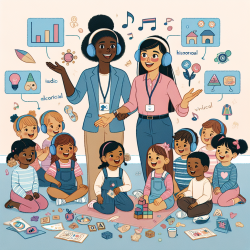Introduction
Understanding the dynamics of adolescent relationships is crucial for practitioners aiming to foster healthy socioemotional development in young individuals. A recent study titled "USA and Portuguese Young Adolescents’ Perceived Qualities and Satisfaction in Their Relationships with Mothers, Fathers and Best-Friends" provides valuable insights into how cultural contexts influence these relationships. This blog explores the study's findings and suggests ways practitioners can apply these insights to improve outcomes for children.
Key Findings from the Study
The study compared the perceived qualities and satisfaction in relationships among adolescents from the USA and Portugal. Key findings include:
- Adolescents in both countries reported higher satisfaction in relationships with mothers and best friends compared to fathers.
- USA adolescents perceived higher negativity and power imbalances in parent-child relationships than Portuguese adolescents.
- Supportive relationships were linked to higher satisfaction across both cultural contexts.
Implications for Practitioners
Practitioners can leverage these findings to enhance their interventions:
- Cultural Sensitivity: Recognize that cultural norms significantly impact relationship dynamics. Tailor interventions to respect and incorporate these cultural differences.
- Focus on Support: Emphasize the development of supportive relationships. Encourage parents to foster environments that prioritize emotional support and open communication.
- Address Negativity: Implement strategies to reduce conflict and negativity in parent-child relationships, particularly in cultures where power imbalances are more pronounced.
Encouraging Further Research
While this study provides a robust foundation, further research is necessary to explore the nuances of adolescent relationships across diverse cultures. Practitioners are encouraged to engage in or support research that examines these dynamics in different contexts, contributing to a more comprehensive understanding of adolescent development.
Conclusion
By integrating the insights from this study into practice, practitioners can better support adolescents in navigating their complex relationships. This approach not only enhances individual outcomes but also contributes to the broader goal of promoting healthy development across cultural contexts.
To read the original research paper, please follow this link: USA and Portuguese Young Adolescents’ Perceived Qualities and Satisfaction in Their Relationships with Mothers, Fathers and Best-Friends.










